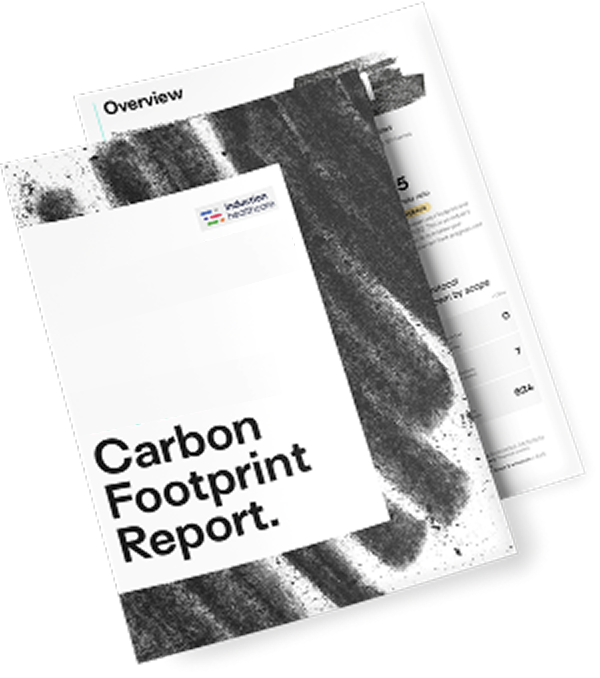Sustainability: Our Journey
to Net Zero

The steps we’re taking to get there
When it comes to reporting progress, you’ll often see the terminology ‘Scope 1, 2 and 3 emissions’ used, but what do these numbers mean?
Scope 1 refers to emissions that occur from sources that are controlled or owned by a company. As a ‘remote first’ company that does not own offices or vehicles we have no Scope 1 emissions.

We’ve been working with third-party sustainability specialists, to measure our carbon footprint and to create an ambitious plan to work towards Net Zero. With their guidance, based on our initial 2022-2023 baseline report we have set ourselves targets to halve emissions by 2030 and achieve Net Zero by 2040 across the Group.
Our current targets are to decrease our total carbon emissions to:
By 2030: 316 tCO2e - a reduction of 50%
By 2040: 0 tCO2e - a 100% reduction
“We have set ourselves targets to halve emissions by 2030 and achieve Net Zero by 2040 across the Group.”

Our Journey so far

To date we’re ahead of our plans and in line with Scope 3 we have implemented a Sustainable Business Travel Policy that includes an approval process for travel, helping us increase accountability and reduce non-essential travel. Employees must also choose the most sustainable mode of travel, with the overarching principle that journeys should be made by public transport wherever possible. Air travel is only permitted when travel by train is not possible or where the air travel is significantly more economical.
Through our work with NHS customers, we have also reduced emissions further. Examples include:
NHS Lancashire Teaching Hospitals, Nephrology – Attend Anywhere
Over a two-year period, the implementation of Attend Anywhere has:
- Saved 11,718 kg of CO2 emissions
- Reduced petrol and parking costs by £8,855
- Saved an estimated 540 hours of patient travel time
Milton Keynes University Hospitals – Paperless Option on Patient Portal
Between January 2022 and December 2022, over 162,000 letters have gone paperless. This means the potential reduction of up to 2,632,960 Ibs of C02 emissions into the atmosphere and up to 47,872,000 Ibs of C02 being absorbed.
Our future plans
As we continue taking immediate steps towards Net Zero, in the near future we are considering implementing further new measures, including:
A procurement policy that requires us to only work with suppliers that disclose their emissions levels and have their own reduction targets. This could potentially save 10.9 tCO2e.
Improving our reuse and repair of hardware by aiming to keep laptops in use for 4-5 years, which could potentially save 5.2 tCO2e.
“Our commitment to achieving Net Zero emissions is not just a goal, it’s a responsibility. As leaders in our sector, we recognise the urgency of addressing climate change and in turn supporting the NHS to achieve their own targets.
By investing in sustainable practices, embracing innovation, and holding ourselves accountable, we are dedicated to creating a future where our business thrives in harmony with the environment.”

What is Net Zero?
We’ve all heard of the term ‘Net Zero’, but what does it actually refer to? Net Zero means reaching an optimal balance between the amount of greenhouse gases, including carbon dioxide (CO2) and methane, being emitted into the atmosphere and the amount removed from it. Achieving Net Zero emissions isn’t the same as eliminating all emissions - it means that any emissions produced are offset by measures that remove an equivalent amount of greenhouse gases, leading to a Net Zero increase in atmospheric greenhouse gas levels.
It’s such an important topic that nationally the Department for Energy Security & Net Zero (DESNZ) was established in February 2023 to focus on the aim of securing long-term energy supply for England, bringing down bills and reaching Net Zero.
Net Zero is also a priority for the NHS, and the NHS England Net Zero plan has two key targets that we can assist NHS customers with:
- for the emissions they control directly (the NHS Carbon Footprint), they will reach net zero by 2050, with an ambition to reach an 80% reduction by 2028 to 2032
- for the emissions they can influence (their NHS Carbon Footprint Plus), they will reach net zero by 2045, with an ambition to reach an 80% reduction by 2036 to 2039.
As a forward thinking and innovative company, we naturally want work in a responsible way that is as friendly for the environment as possible, and have created our own Net Zero plans to support both the DESNZ and NHS England targets. To view our full Carbon Emission Plan .
